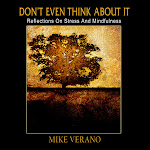 Earth to earth, ashes to ashes, dust to dust.
Earth to earth, ashes to ashes, dust to dust.The Book of Common Prayer
Recently I ran headlong into what the Buddha called anicca, the impermanence of all things. This confrontation occurred during the time-honored tradition known as spring cleaning. Honey-do-list in hand, it hit me, “Didn’t I just do all of this? How can there be so much that needs painting, cleaning, and repairing?” This brought on the first of the Buddha’s four noble truths; life is dukkha, or suffering.
My personal dukkha, in this case, comes from absence of the gene that makes men good at fix-it jobs. I am to home repair what the Buddha apparently was to dieting; not only not good at it, but lacking almost any interest in it. As I sat staring into a brilliant blue sky, the sun just reaching over the trees, I realized that our attachment to forms that will eventually crumble into dust is the source of great pain and suffering. Also, I knew that my efforts to stop things from crumbling often caused me increased pain, as in the hammer hitting the thumb rather than the nail, the weed whacked stone flying into the eye, or the ripping of flesh as the knuckles move but the wrench does not. Most importantly, I knew that Nirvana was just down the river in the form of bass waiting to be caught.
Why bother cutting grass that is only going to grow back, turn brown, die and be taken over by weeds that will dominate all summer? Why clean the deck only to have moss and mold make their way back to reclaim what they believe is rightfully theirs? And for heaven’s sake, why clean leaves out of a gutter when the leaves are capable of decomposing all on their own, creating the black gold known as compost?
My plan was to use my new-found knowledge of the ancient masters to convince my better half that a day not spent on the water fishing was a day wasted. I would win her over to the notion that there is great restorative power in leisure. Here is how my argument went:
Me: You know, the Buddha says that our attachment to things that will eventually dissolve leads to needless suffering. I’m thinking the chores can wait another weekend. I hear the bass are running wild in the creek.
My better half: (Drinks her Yogi tea and does not respond.)
Me: (Somewhat more desperately) The Tao Te Ching says “Retire when work is done, this is the way of heaven.” Who are we to argue with Lao Tzu?
My better half: (Continues to sip her tea in silence).
Me: (Going for the big guns) You know, Jesus said “Do not store up for yourselves treasures on earth, where moth and rust destroy, and where thieves break in and steal. But store up for yourselves treasures in heaven, where moth and rust do not destroy, and where thieves do not break in and steal.” You also know he was very fond of fishermen.
My better half: (Putting down her tea) When you can turn water into wine, you get a pass on the chores list. Practice mindfulness as you power-wash the deck.
Solemnly, I turned my attention back to the list. I marveled at how the paper contained within it all the elements of the universe. I considered the interdependent relationships that had brought about its existence. Within that piece of paper were the sun, the wind, and the rain. All of them seemed to be mocking me now through the silent scribble of ink that was mapping out my weekend. I wondered how long would it take for this paper to dissolve into the eternal cycle of life and death? And more importantly, would that get me out of chore number five which was to clean out the gutters?






No comments:
Post a Comment